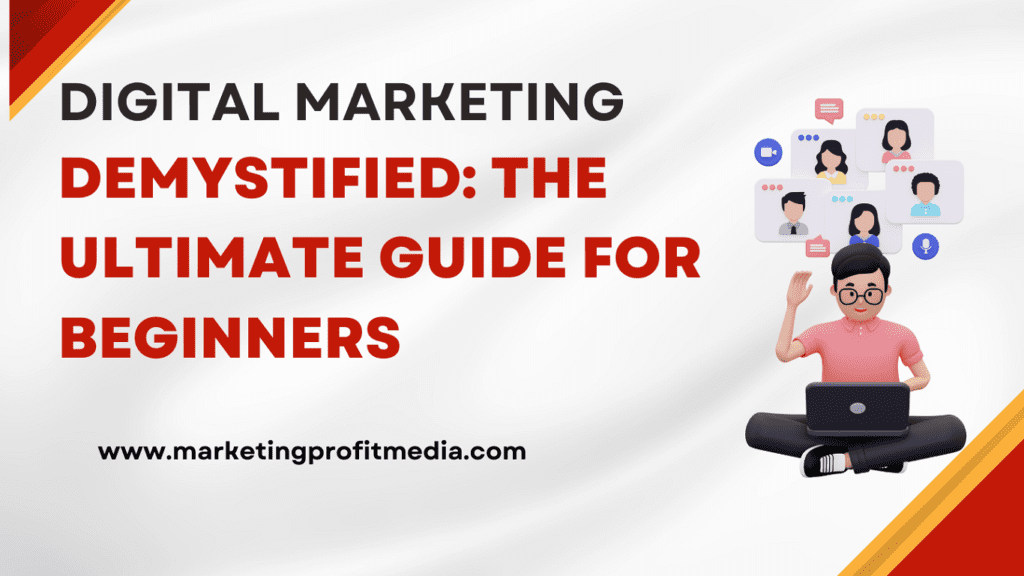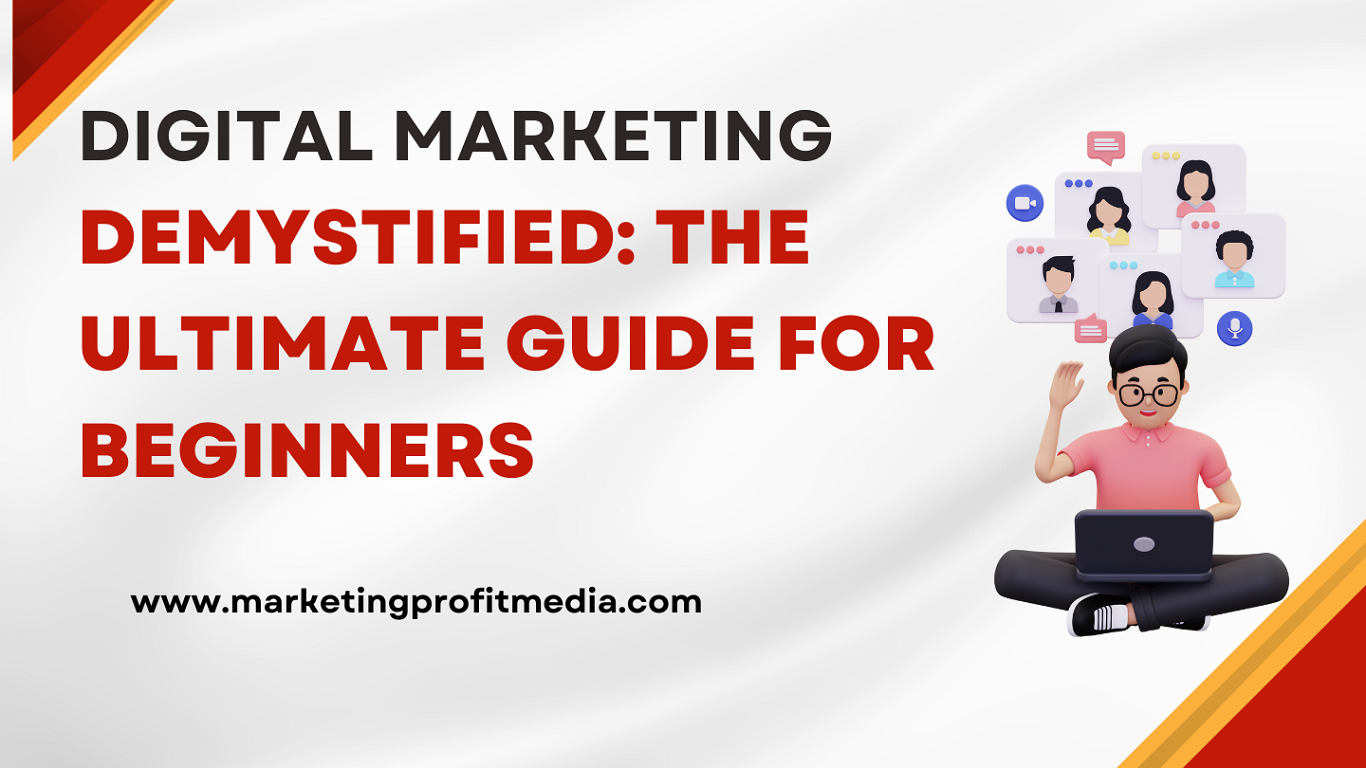Today, digital marketing is the key to success for businesses, completely changing the way they interact with their target market. In the modern, technologically-driven world, it is essential to grasp the subtleties of this ever-evolving sector. Thank you for visiting “Digital Marketing Demystified: The Ultimate Guide for Beginners.“
My Best Recommended & Proven Way to Make $100 Daily – Watch THIS FREE Training to START >>

We set out on a quest to unravel the complex realm of digital marketing in this all-inclusive book, illuminating its importance, variety of channels, and strategic nuances. This book may be used as a compass for anybody looking to improve their digital abilities, small company owners, or aspiring entrepreneurs. We will decipher the enigmas of email advertising, social media marketing, SEO, and more. By the conclusion, you’ll have acquired the information and understanding required to fully use digital marketing for your business. Come with me as we deconstruct the digital world.
1. The Importance of Digital Marketing
Digital marketing has become indispensable in the modern business landscape. It levels the playing field, offering businesses of all sizes the ability to connect with a global audience, drive targeted traffic, and boost brand visibility cost-effectively. Discover why it’s a game-changer.
2. Understanding Digital Marketing Channels
Digital marketing offers a myriad of avenues to connect with your audience. From the instant engagement of social media marketing to the long-term benefits of SEO, each channel has its unique strengths. In this section, we’ll dissect these channels, helping you navigate the digital landscape effectively.
3. Creating a Digital Marketing Strategy
Success in digital marketing hinges on a well-crafted strategy. In this section, we’ll guide you through the process of defining your target audience, setting SMART goals, choosing the most effective channels, and crafting engaging content. Your roadmap to digital marketing excellence begins here.
4. Measuring Digital Marketing Success
Effective digital marketing goes beyond implementation; it’s about measuring results. Explore the critical role of key performance indicators (KPIs), analytics tools, and A/B testing in evaluating the performance of your campaigns. Discover how to refine your strategies based on data-driven insights for lasting success.
5. Common Mistakes to Avoid
Navigating the digital marketing landscape can be tricky, but understanding and sidestepping common pitfalls is essential. Learn about the blunders such as neglecting mobile optimization, overlooking SEO best practices, ignoring social media engagement, and failing to adapt to emerging trends. Avoiding these missteps is key to achieving digital marketing success.
6. Digital Marketing Tools and Resources
Equipping yourself with the right tools is crucial in the world of digital marketing. Explore marketing automation software, social media management tools, essential SEO plugins, and online learning platforms. Discover how these resources can streamline your efforts and enhance your digital marketing expertise.
7. Future Trends in Digital Marketing
The digital marketing landscape is ever-evolving, and staying ahead is paramount. Explore future trends such as voice search, artificial intelligence (AI), video marketing, and influencer collaborations. Understand how embracing these innovations can keep your digital marketing strategies on the cutting edge of industry dynamics.
My Best Recommended & Proven Way to Make $100 Daily – Watch THIS FREE Training to START >>
The Importance of Digital Marketing
Digital marketing has become essential to people’s and companies’ prosperity in the digital era. Here are a few essential tips on why it’s so crucial:
- Global Reach: Digital marketing erases geographical boundaries, allowing you to reach a vast global audience. Whether you’re a local business or a multinational corporation, the internet provides a level playing field.
- Targeted Engagement: Through precise targeting, you can tailor your digital marketing efforts to connect with individuals who are genuinely interested in your products or services. This leads to higher conversion rates and a better return on investment.
- Cost-Effective: Compared to traditional advertising methods, digital marketing is cost-effective. You can allocate your budget more efficiently, optimizing your spending for maximum results.
- Real-Time Analytics: Digital marketing provides real-time data and analytics, enabling you to track the performance of your campaigns instantly. This data-driven approach allows for quick adjustments to improve outcomes.
- Brand Visibility: Building an online presence through digital marketing increases your brand’s visibility, making it easier for potential customers to find and connect with you.
- Customer Engagement: Engaging with your audience through social media, email, and other digital channels fosters relationships and builds trust, which can lead to loyal customers and brand advocates.
- Adaptability: In the fast-paced digital landscape, you can adapt your strategies rapidly to stay current with trends and consumer behaviors, ensuring your marketing efforts remain effective.
Digital marketing isn’t just a choice; it’s a necessity for anyone looking to thrive in today’s competitive business environment. Embracing digital strategies allows you to connect, engage, and prosper in the digital era.
Understanding Digital Marketing Channels
Digital marketing offers a diverse array of channels, each with its unique advantages. Here are key tips to help you navigate this multifaceted landscape:
- Social Media Marketing: Platforms like Facebook, Instagram, Twitter, and LinkedIn allow you to connect with your audience, share content, and build brand identity. Choose platforms that align with your target demographic.
- Search Engine Optimization (SEO): SEO enhances your website’s visibility on search engines like Google. Optimizing keywords, content, and technical aspects is vital for organic traffic growth.
- Email Marketing: Create personalized, engaging email campaigns to nurture leads and convert them into customers. Email remains a powerful tool for building relationships.
- Content Marketing: High-quality, relevant content is the foundation of digital marketing. Blogs, videos, infographics, and podcasts can establish authority and engage your audience.
- Paid Advertising: Platforms like Google Ads and social media ads offer paid advertising options. Use these strategically to reach a wider audience and boost conversions.
- Affiliate Marketing: Partner with affiliates who promote your products or services for a commission. This can extend your reach and drive sales.
- Influencer Marketing: Collaborate with influencers in your niche to leverage their credibility and reach. Their endorsement can significantly impact your brand.
- Online Communities: Engage with online forums, groups, and communities where your target audience gathers. Sharing valuable insights can establish your expertise.
Understanding these digital marketing channels and selecting the ones aligned with your goals and audience is key to crafting a successful digital marketing strategy. Each channel offers unique opportunities for connecting with your audience and achieving your business objectives.
Creating a Digital Marketing Strategy
A well-crafted digital marketing strategy is the compass that guides your online efforts toward success. Here are essential tips to consider when devising your strategy:
- Define Your Target Audience: Understand your ideal customers. Their demographics, preferences, and pain points should shape your strategy.
- Set SMART Goals: Specific, Measurable, Achievable, Relevant, and Time-bound goals provide a clear direction and a means to measure success.
- Choose the Right Channels: Select digital marketing channels that align with your audience and objectives. Not every channel is suitable for every business.
- Craft Engaging Content: Content is king. Develop high-quality, relevant content that resonates with your audience and adds value.
- Consistency is Key: Maintain a consistent online presence across channels. This builds trust and keeps your brand top of mind.
- Analyze and Adjust: Regularly analyze data and metrics to evaluate your strategy’s effectiveness. Be prepared to adapt and refine your approach as needed.
- Budget Wisely: Allocate your budget efficiently among different channels and campaigns. Monitor spending to ensure a positive ROI.
- Competitive Analysis: Study your competitors’ strategies to identify opportunities and areas where you can differentiate yourself.
- Testing and Optimization: Implement A/B testing to refine your campaigns continuously. Small tweaks can lead to significant improvements.
- Stay Informed: The digital landscape evolves rapidly. Stay up-to-date with industry trends and emerging technologies to remain competitive.
By following these tips, you’ll be better equipped to create a digital marketing strategy that not only reaches your audience but also drives meaningful results, helping you achieve your business objectives effectively and efficiently.
Measuring Digital Marketing Success
Effective digital marketing isn’t just about implementing strategies; it’s about tracking and measuring your progress to ensure your efforts yield results. Here are essential tips for measuring digital marketing success:
- Define Key Performance Indicators (KPIs): Identify the specific metrics that align with your goals, whether it’s website traffic, conversion rates, click-through rates, or social media engagement.
- Utilize Analytics Tools: Leverage powerful analytics platforms like Google Analytics and social media insights to gain deep insights into user behavior and campaign performance.
- A/B Testing: Conduct A/B tests to compare variations of your marketing efforts. This method helps you identify what works best and optimize accordingly.
- Conversion Tracking: Set up conversion tracking to measure actions that matter, such as form submissions, downloads, or purchases, to assess the impact of your campaigns.
- ROI Analysis: Calculate your return on investment (ROI) to ensure your marketing expenditures generate a positive return. Compare the cost of acquisition to the revenue generated.
- Customer Feedback: Collect customer feedback through surveys or reviews to gauge satisfaction and identify areas for improvement.
- Regular Reporting: Establish a consistent reporting schedule to monitor progress over time. This facilitates data-driven decision-making.
- Benchmarking: Compare your performance against industry benchmarks to gain insights into where you stand in your sector.
- Attribution Models: Implement attribution models to understand the customer journey better and allocate credit to various touchpoints in the conversion path.
- Continuous Improvement: Use data to make informed adjustments to your digital marketing strategy. Test new ideas and iterate based on what you learn.
Measuring digital marketing success is not only about tracking numbers but also about leveraging those insights to refine your strategies continually. By monitoring and analyzing performance metrics, you can optimize your efforts and maximize your digital marketing impact.
My Best Recommended & Proven Way to Make $100 Daily – Watch THIS FREE Training to START >>
Common Mistakes to Avoid
Averting typical errors in the field of digital marketing might be the difference between success and stagnation. Here are essential tips to help you sidestep these frequent blunders:
- Neglecting Mobile Optimization: With a significant portion of online traffic coming from mobile devices, not optimizing your website and content for mobile users can lead to missed opportunities.
- Overlooking SEO Best Practices: Ignoring SEO principles like keyword research, on-page optimization, and quality backlink building can hinder your visibility on search engines.
- Ignoring Social Media Engagement: Simply posting content on social media isn’t enough. Engaging with your audience through comments, messages, and discussions is vital for building relationships.
- Failing to Adapt to Trends: The digital landscape evolves rapidly. Sticking to outdated strategies without embracing emerging trends can result in stagnation.
- Inconsistent Branding: Incoherent branding across different digital channels can confuse your audience and weaken brand identity. Consistency is key.
- Neglecting Analytics: Not utilizing data and analytics tools to measure performance and make informed decisions can lead to missed opportunities for improvement.
- Poor Content Quality: Content is the cornerstone of digital marketing. Low-quality or irrelevant content can damage your reputation and deter potential customers.
- Lack of Clear Goals: Without well-defined goals, your digital marketing efforts may lack direction, making it challenging to measure success.
- Ignoring Competition: Failing to keep an eye on competitors can mean missing out on valuable insights and opportunities to differentiate your brand.
- Overloading Campaigns: Bombarding your audience with too much information or too many messages can overwhelm and turn them away.
By recognizing and avoiding these common mistakes, you can ensure your digital marketing efforts are more effective and aligned with your goals, ultimately driving better results and a stronger online presence.
Digital Marketing Tools and Resources
Navigating the complex world of digital marketing is made significantly easier with the right tools and resources at your disposal. Here are valuable tips to help you make the most of them:
- Marketing Automation Software: Invest in marketing automation platforms like HubSpot or Mailchimp to streamline tasks like email marketing, lead nurturing, and customer relationship management.
- Social Media Management Tools: Platforms like Hootsuite and Buffer allow you to schedule posts, monitor engagement, and track the performance of your social media campaigns efficiently.
- SEO Plugins and Tools: Utilize SEO plugins for your website, such as Yoast SEO for WordPress, and powerful SEO tools like SEMrush or Moz for keyword research, backlink analysis, and site optimization.
- Online Learning Platforms: Enroll in courses on platforms like Coursera, Udemy, or HubSpot Academy to continually upgrade your digital marketing knowledge and skills.
- Content Creation Tools: Tools like Canva and Adobe Spark simplify the creation of visually appealing graphics and multimedia content for your campaigns.
- Email Marketing Software: Invest in email marketing platforms like Mailchimp, Constant Contact, or SendinBlue to create, send, and analyze email campaigns effectively.
- Analytics Dashboards: Set up custom analytics dashboards in Google Analytics or Data Studio to track and visualize data relevant to your goals and KPIs.
- Competitive Analysis Tools: Tools like SimilarWeb and SpyFu help you gain insights into your competitors’ strategies and online presence.
- Conversion Rate Optimization (CRO) Tools: Tools such as Optimizely and VWO help you run A/B tests and optimize your website for higher conversion rates.
- Community Forums and Blogs: Engage with digital marketing communities, follow industry blogs, and participate in discussions to stay updated on trends and best practices.
By leveraging these digital marketing tools and resources, you can enhance your efficiency, gain valuable insights, and stay at the forefront of the ever-evolving digital marketing landscape. These assets are your allies in crafting successful, data-driven strategies and achieving your marketing goals.
Future Trends in Digital Marketing
The digital marketing landscape is in a constant state of evolution, and staying ahead of emerging trends is crucial for sustained success. Here are some key insights into the future of digital marketing:
- Voice Search: As voice-activated devices become increasingly common, optimizing content for voice search will be vital. Understanding natural language queries and providing concise, relevant answers will be paramount.
- Artificial Intelligence (AI): AI-driven tools and chatbots will personalize user experiences, enhance customer service, and automate routine tasks like content curation and data analysis.
- Video Marketing: The dominance of video content will continue to grow. Live streaming, interactive videos, and short-form video content on platforms like TikTok and Instagram will capture audiences’ attention.
- Influencer Marketing: Collaboration with micro and nano-influencers will become more prevalent as they tend to have highly engaged, niche audiences that trust their recommendations.
- Augmented Reality (AR): AR experiences, like virtual try-ons and interactive ads, will engage users and provide immersive brand interactions.
- Data Privacy: With increasing concerns about data privacy, marketers must prioritize transparency and ethical data usage to maintain consumer trust.
- Content Personalization: Tailoring content to individual preferences using data-driven insights will become the norm, enhancing user engagement and conversion rates.
- User-Generated Content (UGC): Encouraging customers to create content about your brand will continue to be a powerful marketing strategy, fostering authenticity and trust.
- Sustainability and Social Responsibility: Consumers are increasingly drawn to brands that prioritize sustainability and social responsibility. Green marketing and ethical practices will gain prominence.
- Mobile-First Approach: As mobile device usage soars, optimizing for mobile will be paramount, from website design to ad campaigns.
Understanding and embracing these future trends will position you at the forefront of digital marketing. Adapting to these shifts and leveraging them in your strategies will be essential for staying competitive and engaging with the ever-evolving digital audience.
Conclusion
Digital marketing success requires constant learning, agility, and strategic accuracy. Remember that good digital marketing is a long-term investment as we end this course. You can maximize digital potential by knowing your audience, creating objectives, using the correct channels, and assessing your success. Be flexible, adopt new trends, and keep improving your methods. Digital marketing, with its endless possibilities, drives brand development. May you succeed in making your brand a digital powerhouse in this changing environment.
My Best Recommended & Proven Way to Make $100 Daily – Watch THIS FREE Training to START >>
Thanks for reading my article on “Digital Marketing Demystified: The Ultimate Guide for Beginners“, hope it will help!














